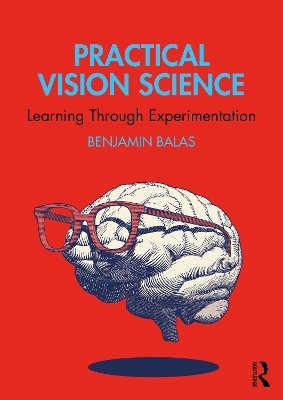
Practical Vision Science
Learning Through Experimentation
Seiten
2024
Routledge (Verlag)
978-1-032-69115-2 (ISBN)
Routledge (Verlag)
978-1-032-69115-2 (ISBN)
This workbook provides a collection of experiments and observations that use physical materials (rather than digital displays or resources) to reveal fundamental properties of the human visual system.
Practical Vision Science centers discovery, observation, and critical thinking. By observing and manipulating visual phenomena, readers gain insights regarding visual processing from the outside world into high-level areas of the visual cortex. The text covers geometric optics, image formation, early stages of visual processing, and inferences regarding brightness, color, depth, motion, and form. The goal is to highlight the critical role that observation of one’s own sensory experiences plays in vision science, while introducing phenomena that provide clues about the computations and constraints that shape our experience of the visual world. Each exercise can be completed with everyday materials, and the text includes discussion of key phenomena readers should be able to observe and the implications of these effects for underlying mechanisms that support visual experience in each case.
Practical Vision Science is an essential text for upper undergraduate and postgraduate students of Sensation and Perception, providing the opportunity to learn by doing things rather than reading facts about the visual system on the page.
Practical Vision Science centers discovery, observation, and critical thinking. By observing and manipulating visual phenomena, readers gain insights regarding visual processing from the outside world into high-level areas of the visual cortex. The text covers geometric optics, image formation, early stages of visual processing, and inferences regarding brightness, color, depth, motion, and form. The goal is to highlight the critical role that observation of one’s own sensory experiences plays in vision science, while introducing phenomena that provide clues about the computations and constraints that shape our experience of the visual world. Each exercise can be completed with everyday materials, and the text includes discussion of key phenomena readers should be able to observe and the implications of these effects for underlying mechanisms that support visual experience in each case.
Practical Vision Science is an essential text for upper undergraduate and postgraduate students of Sensation and Perception, providing the opportunity to learn by doing things rather than reading facts about the visual system on the page.
Benjamin Balas is a Professor of Psychology at North Dakota State University, USA. He received both his SB and PhD from MIT’s Department of Brain and Cognitive Sciences and completed post-doctoral work at Children’s Hospital Boston.
1. What is Light and What Does It Do? 2. Image Formation in the Eye 3. Measuring Light with the Retina 4. Spatial Vision in the LGN and V1 5. Perceptual Organization and Gestalt Principles 6. Brightness and Color Constancy 7. Depth Perception 8. Motion Perception 9. Face Perception
| Erscheinungsdatum | 23.08.2024 |
|---|---|
| Zusatzinfo | 24 Line drawings, color; 91 Halftones, color; 115 Illustrations, color |
| Verlagsort | London |
| Sprache | englisch |
| Maße | 174 x 246 mm |
| Gewicht | 458 g |
| Themenwelt | Geisteswissenschaften ► Psychologie ► Allgemeine Psychologie |
| Geisteswissenschaften ► Psychologie ► Verhaltenstherapie | |
| ISBN-10 | 1-032-69115-8 / 1032691158 |
| ISBN-13 | 978-1-032-69115-2 / 9781032691152 |
| Zustand | Neuware |
| Haben Sie eine Frage zum Produkt? |
Mehr entdecken
aus dem Bereich
aus dem Bereich
Buch | Softcover (2024)
Hogrefe Verlag
34,95 €
wie Affekte innere Entwicklung ermöglichen
Buch | Softcover (2023)
Klett-Cotta (Verlag)
30,00 €


